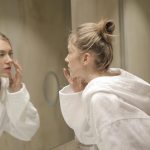We all know how important sleep is.
When I worked in a health foods store, the most common question I got was “what will help me sleep better?” The sad reality is that 30-40% of Americans suffer from some sort of sleep issue, whether it’s falling asleep, staying asleep, or waking up too early (always a bummer when you want to sleep in!). Today’s stressful world makes it way to easy to be a worrywart, and you might find yourself waking in the night with a head full of things to mull over.
I’ve always been fascinated by sleep because I myself have always struggled with sleep. I’ve tried sleeping pills, supplements, and have even worked with a sleep practitioner as well as completed a sleep study. I’ve taken classes and done extra research on sleep because I know how much of a struggle it can be to get enough of it, and how gosh darn frustrating it is to stare at the ceiling for hours on end, when you just want your brain to shut off.
Funny how something so necessary for survival is just plain hard to do. Here are the some techniques that work really well:
Stop sleeping with your phone and your TV
You’ve probably heard this one before, but if you’re still sleeping with electronics, I’m here to drill this in for you. Yes, we live on our phones, and with all of the streaming apps, we have endless entertainment at our fingertips. Not to mention that a lot of people use (or perhaps misuse?) their phones and televisions to fall asleep. Don’t fool yourself with this strategy. There are several layers to why this is interfering with your sleep, even if you’re convinced it’s helping.
One is stimuli. Our phones and televisions stimulate our brains, keeping us alert. You may think that they are helping you fall asleep, but you’d be much better served by a noise machine or reading a book about economics (which is what I used to do to bore myself to sleep. Sorry econ nerds). Think about it – playing games, reading entertaining articles, or watching the news are highly stimulating, so it would make sense that it would keep you up and give your brain even more material to work with.
The other layer is blue light. Electronics emit blue light, which actually lowers your melatonin and increases your cortisol, the stress hormone.
This creates a hormonal imbalance that makes it difficult to fall asleep. Our brains make their own melatonin. We need melatonin to be high at night in order to initiate sleep. When melatonin is high, cortisol is low, and sleep is more successful. However, when we expose ourselves to screens, the blue light raises cortisol levels, which decreases melatonin, making it harder to fall asleep. Even if you feel that having the TV on helps lull you to sleep, it likely isn’t going to be quality sleep because your melatonin levels will be effected by the blue light exposure (yes, even if your eyes are closed! You’re not fooling anyone!).
The third layer is exposure to electromagnetic field radiation (or EMF). We are exposed to EMF from our phones, computers, microwaves, TVs, fitness tracking devices, and power lines (so essentially, everywhere!). It would behoove you to turn your Wifi off every night to limit this exposure. Limiting or eliminating electronics from the bedroom is a great way to limit your EMF exposure. If you must sleep with your phone and/or TV in your room, put your phone in airplane mode, keep it unplugged, and unplug your TV (or better yet, move it out of the bedroom!).
You can also install warm light settings on all of your electronics to pull the blue light out of them as the day turns to night. Apps like Flux and Twilight do this, as well as the nightshift setting for Apple products.
Blue light blocking glasses
Ok, even I will admit, nighttime is the best time to watch my favorite shows. However, this isn’t the best tactic for sleep. The best tactic for sleep would be to finish looking at ALL screens 1-2 hours before bed. But that’s not always fun! And sometimes we need to unwind after a long day of work with some mindless entertainment. Introducing: blue light blocking glasses. You might have seen these before – the original ones look like orange construction glasses. Now you can get them with your prescription glasses and they don’t even have to be orange!
Investing in a pair of blue light blocking glasses helps reduce your blue light exposure when looking at screens, hence saving some of that melatonin for when you need it most! You can wear these glasses all day long, but they are especially helpful to pop on once nighttime descends.
Dim lighting
Another habit to get into is dimming your lighting or using low lighting at nighttime. As soon as you need to turn on lights in the evening, stick to low lighting to support your sleep. You can buy lamps, install dimmers, or heck – go old school and light some candles or oil lamps. I love using salt lamps at night – they even make salt lamp night-lights now and they are very soothing.
Understand and harness sleep cycles
Understanding and using sleep cycles to your advantage can help you wake up feeling more refreshed in the morning. A full sleep cycle has four stages and takes about 90 minutes to complete each stage. Thus, you could think about your night of sleep as blocks of 90-minute cycles. Consider this. If you go to bed at 10pm and your alarm goes off at 7am, ideally you are asleep in bed for those full 9 hours, which breaks down to six 90-minute sleep cycles. If you time it correctly, your alarm should be going off when you’re at the end of a sleep cycle. If you were to go to bed at 11pm and wake at 7am, then you might be interrupting a sleep cycle in the middle of deep sleep, leaving you feeling sleepy.
The easiest way to figure out how to do this is to start with what time you have to wake up in the morning. If you set an alarm, start with that time and work backwards in 90-minute increments until you get to your ideal bedtime. Keep in mind that if you normally go to bed at 11pm but decide you’d rather go to bed earlier, you might have trouble falling asleep. I recommend gradually working your bedtime earlier by 15 minutes every few days to avoid lying in bed staring at that ceiling. Which brings me to my next hack – restricting your awake time in bed.
Restrict your awake time in bed
If it normally takes you more than 30 minutes to fall asleep, then you might be spending too much time awake in bed. Spending too much time awake in bed can cause you to associate your bed with being awake. The idea is to associate your bed with sleep! Working with a sleep practitioner helped me hone sleep restriction and it works beautifully for me. That being said, it’s not easy to do if you wake up in the middle of the night and want nothing more than to fall back asleep. But if you lay awake in bed for too long, you could be setting the stage for insomnia. Consider going to bed at the time you usually fall asleep (as opposed to the time you want to go to sleep), and/or getting out of bed if you’ve been lying awake for more than 30 minutes. Again, you can gradually work to an earlier bedtime if you desire.
This applies if you wake in the night and can’t fall back asleep right away. Getting out of bed and going somewhere else, like the couch, to rest or read or do some kind of low-light activity can improve your sleep long-term, even if it feels counterintuitive. Once you feel sleepy again, transport yourself back to your bed to try again.
Improve your nutrition (of course!)
There are certain foods that can definitely impact sleep. There are also eating strategies that can support a good night of sleep, such as balancing your blood sugar.
Foods to consider avoiding close to bedtime or altogether:
- Sugar
- Processed foods
- Alcohol
- Caffeine
Consider a small blood sugar balancing snack at night, such as a few crackers with cheese, a small bowl of yogurt with slivered almonds, a handful of nuts and some blueberries, a hard-boiled egg, pr hummus and veggies. Don’t go overboard – you don’t want your digestion interfering with your sleep. However, dips in blood sugar in the middle of the night can definitely wake you up.
Consider targeted supplements
When people think of sleep supplements, their first go-to is melatonin. However, you might not need melatonin if your melatonin isn’t low. You first need to figure out what might be causing your sleep woes, and then go from there. Working with a Naturopath and/or Nutritionist can help you hone in on this.
There are certain supplements that are quite useful in supporting healthy sleep and also tend to be deficient in most people. Magnesium glycinate and vitamin D are two I would recommend for most people. I highly recommend working with someone who is well-versed in supplements because magnesium can also cause diarrhea, so it’s important to approach supplements carefully.
Herbs are also great for supporting sleep, and a sleep tincture that consists of herbs such as skullcap, valerian, passionflower, catnip, lemon balm, etc. could be a nice nightcap to lull you to sleep.
And if you suffer from the never-ending loop of thoughts, consider homeopathy. One in particular called Coffea Cruda can help with overactive minds. You might also consider journaling your thoughts before bed, or even just sitting down to “think” your thoughts each day. It might sound too simple, but you’d be surprised how much this can help. Plus, when was the last time you allowed yourself to just sit and think?
If all else fails, or if you’re considering supplementation, consult with a certified and credentialed Nutritionist (such as Yours Truly) or a Naturopathic physician. Either of these professionals can help you hone in on a plan to cultivate a better night of sleep.
Sweet dreams!
Photo courtesy of Fabian Oelkers on Unsplash.




